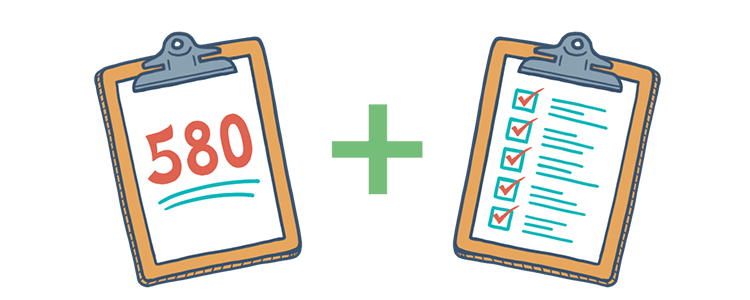Your Lender's Requirements

By now you’ve heard plenty about the FHA’s minimum, 580-credit score requirement on home loans with 3.5% down payments. This is a major reason why so many first-time homebuyers opt for FHA mortgages. It is, however, important to note that while the Federal Housing Administration has set this limit on loans they will insure, it is not always the case that lenders will approve a loan for borrowers with low scores. It is very common that lenders have their own, additional requirements for FHA loans that they provide, generally called “overlays.”
What Are Lender Overlays?
In the context of home mortgages, the word “overlay” refers to eligibility criteria that lenders and underwriters put in place in addition to the requirements set by Fannie Mae, Freddie Mac, the FHA, or any entity that is insuring the loan. A common overlay individual lenders place on FHA loans is a higher credit score requirement than the 500-minimum set by the FHA. Think of it as an added level of protection a lender or investor opts for to avoid defaults and foreclosures.
Why Lenders Place Additional Credit Requirements
When it comes down to it, even though the FHA is insuring your loan, your lender is the one taking on the risk. Now if you’re making a low down payment of 3.5% and you have a low credit score, approving you for a loan would be considered an even greater risk.
Many lenders impose their own rules on top of FHA guidelines to protect themselves from costly foreclosures. Even though they provide FHA-insured loans, they might not be comfortable taking on a borrower with a FICO score of 580. So, they may increase the minimum credit score limit to 620 or so.
Lenders also place overlays according to their business cycle. They may place higher credit score requirements when they notice a trend of delinquent mortgage payments or if they're in a market where home values are going down.
Overlays also change in response to the times. After the housing market crisis in 2008, lenders were forced to place more strict requirements on their approval process. Depending on the economic situation in the country and based on what banks are willing to underwrite, loans may require much higher credit scores in the short term.
Knowing about these additional credit requirements that lenders place can go a long way. Borrowers who know what to expect can start working on improving their FICO scores earlier on to ensure they get the best interest rate from their lenders.
Additional Overlays
Credit scores aren’t the only thing that lenders place overlays on. They can loosen or tighten other criteria that goes into loan approval. Investors or lenders may place eligibility requirements on the number of credit lines a borrower has, minimum employment requirements, and appraisal processes.
It is common for lenders or investors to add overlays in regard to a borrower’s employment history. Where the FHA only requires a borrower have 6 months on the job, and the lender might increase that minimum. They may also place an eligibility requirement on the lines of credit a borrower has and how long they’ve had it.
During the recent breakout of COVID-19, many lenders have loosened guidelines to accept drive-by home appraisals for FHA and VA loans. They have also adopted different forms of employment verification, including emails from employers and bank statements with payroll deposits.
Automated Loan Underwriting
Along with most of the mortgage industry, the FHA has started adopting Automated Underwriting when approving loans. In order to decrease the processing time for loans, lenders use Automated Underwriting which gives a computer-generated loan decision, based on predetermined eligibility factors. That could mean that programs are set to automatically reject applications that show lower credit scores.
This technology is widely used to approve credit cards, and it is becoming more and more popular for home loans as well. While exceptions are made for borrowers with lower scores, those exceptions are made manually. To avoid being disqualified by the automated system, it’s more important than ever that borrowers work to improve their credit scores.

FHA Loan Articles
February 12, 2024When you are approved for an FHA One-Time Close Construction loan, you get a single loan that pays for both the costs to build the house, and serves as the mortgage. One application, one approval process, and one closing date.
November 22, 2023In the last days of November 2023, mortgage loan rates flirted with the 8% range but have since backed away, showing small but continued improvement. What does this mean for house hunters considering their options to become homeowners soon?
November 4, 2023In May 2023, USA Today published some facts and figures about the state of the housing market in America. If you are weighing your options for an FHA mortgage and trying to decide if it’s cheaper to buy or rent, your zip code may have a lot to do with the answers you get.
October 14, 2023FHA loan limits serve as a crucial mechanism to balance financial sustainability, regional variations in housing costs, and the agency's mission to promote homeownership, particularly for those with limited financial resources.
September 25, 2023Mortgage rates are hitting prospective homeowners hard this year and are approaching 8%, a rate that didn't seem very likely last winter. With so many people priced out of the market by the combination of high rates and a dwindling supply of homes.
September 19, 2023The FHA Handbook serves as a crucial resource for mortgage lenders, appraisers, underwriters, and other professionals involved in the origination and servicing of FHA-insured home loans. It outlines the policies and requirements for FHA-insured mortgages.








